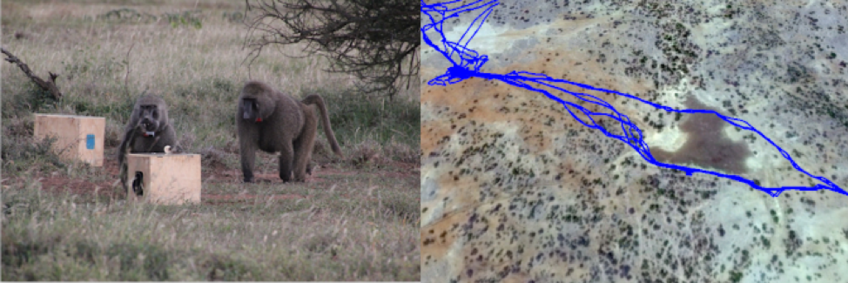
Decision making and collective movement in groups of baboons
We are seeking a PhD student to join an exciting new project on collective movement and decision-making in baboons at the University of Konstanz. The student will carry out research combining behavioral field work, field experiments, animal tracking technologies, and quantitative analysis, and will join an international research team. The position is fully funded for 3.5 years, and open to students of any nationality.
Background. As animals move through their habitat, they confront a continuous stream of choices about how to react to environmental stimuli, and often must make decisions with imperfect or incomplete information. Additionally, for animals that live in stable social groups, long-term social relationships may influence movement decisions, with potential consequences for the dynamics and outcomes of collective decisions. Understanding the way individuals make decisions and solve conflict of interests with other group members, are key to understanding the mechanisms and evolution of collective movement.
Project Details. The student will focus on understanding how groups resolve conflict of interests when group members differ in their motivations and will study how individual decisions scale up to affect group behavior and movements. Research will involve collecting data on the movement and behavior of entire groups of baboons using direct observational methods, and remote tracking technology. The student will design and conduct field experiments using customized feeders that create variation in the amount of food obtained by group members. The project will involve field work at the Mpala Research Station, Laikipia, Kenya, as well as quantitative analysis of movement and behavior. Start date is flexible and will be between June and October of 2020.
Supervision and Research Community. The student will join the International Max Planck Research School for Organismal Biology (IMPRS), a cooperative doctoral program between the Max Planck Institute of Animal Behavior, the Max Planck Institute for Ornithology and the University of Konstanz, and will be co-supervised by Prof. Meg Crofoot and Dr. Roi Harel. The University of Konstanz and the Max Planck Institute for Animal Behavior together form a thriving research community representing a global hotspot for collective behavior and animal movement research.
Qualifications. The project will involve both behavioral biology field work and quantitative data analysis using programming. The ideal candidate should have experience in at least one of these areas as well as a positive attitude and enthusiasm for learning the other. Demonstrated ability to engage in independent research is desirable. A collaborative spirit and the ability to work as part of a team are essential. A Masters degree in ecology, zoology, or a related subject is desirable, but is not required to apply. Applicants who have not completed a Masters will be considered on a case-by-case basis by the Doctoral Committee and might be requested to complete additional course-work. The working language of the group is English, and German language skills are not a requirement.
Location. Konstanz is a vibrant small city located on the border between Germany and Switzerland, on the shores of the Bodensee (Lake Constance). It is easy to get out into the beautiful German and Swiss countryside and the Alps, as well as to neighboring Zurich and Munich.
Application Process. Applicants should apply via the IMPRS application system (due 15 January 2020), and are also required to include a CV and a research statement (see below for details).
Research Statement Instructions. Applicants should include a 1-2 page research statement that addresses the following points:
- Describe your main research interests, how they developed, and how they relate to the proposed research project.
- Describe 1-2 hypotheses you would like to test (or analyses you would like to perform) in the context of the described project, and indicate how you would address them using field experiments or analysis of movement data.
- Give an example of a time in your past education or research experience in which you faced a problem or a challenge, and describe how you addressed it.
Keywords. Collective behaviour, vocal communication, movement coordination, GPS, computational analysis, group coordination, decision-making
Supervisors. Prof. Meg Crofoot and Dr. Roi Harel, University of Konstanz